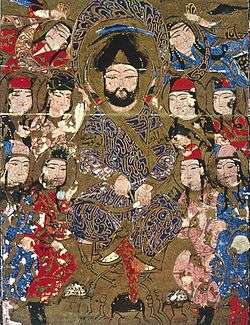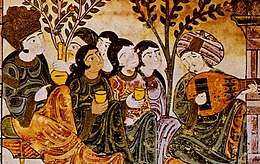Kitab al-Aghani
Kitab al-Aghani (Arabic: كتاب الأغاني, The Book of Songs), is an encyclopedic collection of poems and songs that runs to over 20 volumes in modern editions, attributed to the 10th-century Arabic writer Abu al-Faraj al-Isfahani (also known as al-Isbahani).[1][2] Abu al-Faraj claimed to have taken 50 years in writing the work, which ran to over 10 000 pages and contains more than 16,000 verses of Arabic poetry. It can be seen as having three distinct sections: the first dealing with the '100 Best Songs' chosen for the caliph Harun al-Rashid, the second with royal composers and the third with songs chosen by the author himself.[3] It spans the period from the Jahiliyya to the end of the 9th century CE. Abu al-Faraj importantly included performance directions for many of the songs included in Kitab al-Aghani. Due to the accompanying biographical annotations on the personages', the work is an important historical and historical source; it is also useful for those interested in the sociology of Arabic literature.[4]

Reception
The prominent 14th-century historian Ibn Khaldun called The Book of Songs the register of the Arabs: "It comprises all that they had achieved in past of excellence in every kind of poetry, history, music, etc. So far as I am aware, no other book can be put on a level with it in this respect. It is the final resource of the student of belles lettres and leaves him nothing further to be desired".[5]
Editions
- al-Iṣbahānī, Abū al-Faraj ‘Alī ibn al-Ḥusayn (1900). Kitāb al-Aghāni (in Arabic). 1–7.
- al-Iṣbahānī, Abū al-Faraj ‘Alī ibn al-Ḥusayn (1900). Kitāb al-Aghāni (in Arabic). 8–14.
- al-Iṣbahānī, Abū al-Faraj ‘Alī ibn al-Ḥusayn (1900). Kitāb al-Aghāni (in Arabic). 15-21.
- al-Iṣbahānī, Abū al-Faraj ‘Alī ibn al-Ḥusayn (1900). Kitāb al-Aghāni (in Arabic). 22.
- al-Iṣbahānī, Abū al-Faraj ‘Alī ibn al-Ḥusayn (1868). Kitāb al-Aghāni. 21. Leiden: Brill.
- al-Iṣbahānī, Abū al-Faraj ‘Alī ibn al-Ḥusayn (1900). Tables alphabétiques (Kitāb al-Aghāni). Leiden: Brill.
- al-Iṣfahīnī, Abū al-Faraj. Kitāb al-Aghānī; 21 parts & Index in 9 vols., equiv. to Cairo ed., 1322/1905–5. Dār al-Fikr.
- al-Iṣfahīnī, Abū al-Faraj (2004). Kitāb al-Aghānī. 25. Beirut: Dar Sader Publishers.
See also
| Wikimedia Commons has media related to Kitab al-Aghani. |
- Abu al-Faraj al-Isfahani
- Hamasah
- Imru' al-Qais
- Maqamat (literature)
- Mu'allaqat
- Mufaddaliyat
References
- Abu al-Faraj al-Isfahani, Kitab al-Aghani, 25 vols., Beirut, Dar Sader Publishers: 2004.
- Thatcher, Griffithes Wheeler (1911). . In Chisholm, Hugh (ed.). Encyclopædia Britannica. 1 (11th ed.). Cambridge University Press. p. 79.
- Kilpatrick, Hilary (2010). Making the great Book of songs: Compilation and the Author's Craft in Abû I-Faraj al-Isbahânî's Kitâb al-aghânî. London: Routledge. ISBN 9780415595841.
- Kilpatrick, Hilary (1997). "Abū l-Faraǧ's Profiles of Poets: A 4th/10th Century Essay at the History and Sociology of Arabic Literature". Arabica. 44 (1): 94–128. JSTOR 4057271.
- Sawa, George Dimitri (2016). Erotica, Love and Humor in Arabia : Spicy Stories from The Book of Songs by al-Isfahani. McFarland & Company. p. 2. ISBN 9781476663654.
